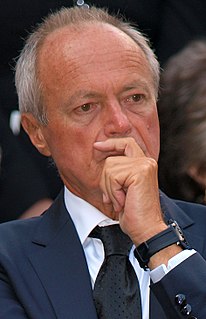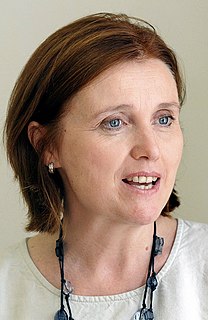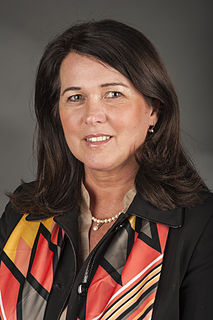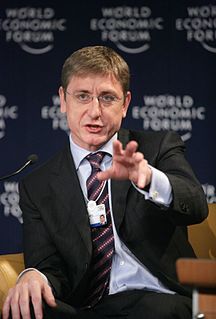
Péter Medgyessy is a Hungarian politician and was the Prime Minister of the Republic of Hungary from 27 May 2002 until 29 September 2004. On 25 August 2004 he resigned over disputes with coalition partner Alliance of Free Democrats, but remained caretaker Prime Minister for a 30-day period as required by the Constitution, and a few additional days until his successor Ferenc Gyurcsány was confirmed by Parliament.

The Hungarian Socialist Party, known mostly by its acronym MSZP, is a social-democratic political party in Hungary.

The National Assembly is the parliament of Hungary. The unicameral body consists of 199 members elected to 4-year terms. Election of members is based on a complex system involving both area and list election; parties must win at least 5% of the popular vote in order to enter the list of members of the assembly. The Assembly includes 25 standing committees to debate and report on introduced bills and to supervise the activities of the ministers. The Constitutional Court of Hungary has the right to challenge legislation on the grounds of constitutionality. The assembly has met in the Hungarian Parliament Building in Budapest since 1902.
The Alliance of Free Democrats – Hungarian Liberal Party was a liberal political party in Hungary.

The Democratic Coalition is a social-liberal political party in Hungary led by former Prime Minister Ferenc Gyurcsány. Founded in 2010 as a faction within the Socialist Party (MSZP), the Democratic Coalition split from the MSZP on 22 October 2011 and became a separate party. It has nine MPs in the National Assembly and two MEPs in the European Parliament.
Elections in Hungary are held at two levels: general elections to elect the members of the National Assembly and local elections to elect local authorities. European Parliament elections are also held every 5 years.

Gábor Demszky is a Hungarian politician, lawyer and sociologist by qualification. Demszky was the Mayor of Budapest from 1990 to 2010. He was a founding member of the Alliance of Free Democrats (SZDSZ) between 1988 and 2010.

Katalin Szili is a former member of the Hungarian Parliament, who served as the Speaker of the National Assembly of Hungary from 2002 to 2009.

A referendum on revoking some medical and tuition fees was held in Hungary on 9 March 2008. The proposals would cancel government reforms which introduced doctor visit fees paid per visitation and medical fees paid per number of days spent in hospital as well as tuition fees in higher education. All three were supported by a majority of voters. Prime Minister Ferenc Gyurcsány stated that the fees would be abolished on 1 April 2008 following the referendum, but that the government had no funds available to replace the income lost for the higher educations institutions and health institutions due to the abolishment of the fees.

Parliamentary elections were held in Hungary on 11 and 25 April 2010 to choose MPs for the National Assembly. They were the sixth free elections since the end of communist era. 386 members of parliament were elected in a combined system of party lists and electoral constituencies. The electoral law does not allow all adult citizens to stand for being elected unless they can validate 500 signatures of other citizens supporting their candidacy.

Éva Tétényi is a Hungarian politician, who served as the mayor of Esztergom between 2010 and 2014. Tétényi formerly worked as an architect.

Imre Mécs is a Hungarian politician. Following the Hungarian Revolution of 1956, he was sentenced to death, then his sentence was mitigated to a prison sentence. He was released in 1963 and worked as an electrical engineer. Later he became founding member of the Alliance of Free Democrats (SZDSZ). He was elected on the SZDSZ party ticket to the Hungarian Parliament in 1990 and served several consecutive terms. Over differences with his party, he quit SZDSZ and was elected on the Hungarian Socialist Party (MSZP) ticket in 2006. He did not manage to win a seat in the 2010 elections, ending his parliamentary career. In the January 2011 he rejoined his old party, SZDSZ.

Csaba Molnár is a Hungarian politician and Member of the European Parliament (MEP) from Hungary. He is a member of the Democratic Coalition. He served as Minister of Transport, Communications and Energy in the second cabinet of Ferenc Gyurcsány, later as a Minister of the Prime Minister's Office in the government of Gordon Bajnai.

The European Parliament election, 2014 for the election of the delegation from Hungary to the European Parliament was held on 25 May 2014.

Hungarian Liberal Party is a liberal political party in Hungary that was formed on 27 April 2013 and is led by Gábor Fodor, a former MP and president of the Alliance of Free Democrats (SZDSZ).

The 2014 Hungarian parliamentary election took place on 6 April 2014. This parliamentary election was the 7th since the 1990 first multi-party election. The result was a victory for the Fidesz–KDNP alliance, preserving its two-thirds majority, with Viktor Orbán remaining Prime Minister. It was the first election under the new Constitution of Hungary which came into force on 1 January 2012. The new electoral law also entered into force that day. For the first time since Hungary's transition to democracy, the election had a single round. The voters elected 199 MPs instead of the previous 386 lawmakers.

A referendum related to the European Union's migrant relocation plans was held in Hungary on 2 October 2016. The referendum was initiated by the government, under the provision of article 8 of the new constitution of 2012. It was commonly referred to as the kvótanépszavazás or kvótareferendum in the Hungarian media.

















